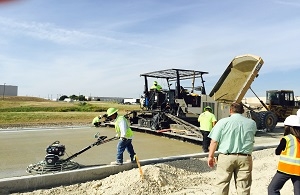On October 8th the Roller Compacted Concrete (RCC) Paving was completed on the North Lucius McCelvey Extension Project. This project is located in Temple’s Industrial Rail Park which was also designed by KPA in 2006. In less than three days, over 12,000 square yards of RCC Paving was constructed. The section included twelve inches of select fill and eight inches of RCC Paving placed between concrete curb and gutter.
KPA recommended RCC Paving to the Temple Reinvestment Zone and the City Staff as a more long term cost effective solution for accommodating high truck loads with reduced maintenance costs for the roadway. The project bid an equivalent asphalt section against the RCC pavement section to analyze the costs. The final bid tabulation showed the RCC pavement section was less than 1% (~$15,000) higher on this $2.0 Million project. Reduction of future maintenance costs by utilizing the RCC Paving, will far outweigh the minor increase in initial construction cost.
 The design did not include reinforcing or dowels as is typically done in standard concrete paving. The mix design specified an aggregate gradation very similar to Texas Department of Transportation Type B Hot Mix Asphalt Pavement. This allows the mix to be compacted with smooth drum rollers shortly after placement and creates an interlocking of aggregates to achieve the designed 4,000 psi concrete. The design also requires a zero slump concrete mix that is stiffer than typical zero slump conventional concrete which provides the required stability for the ten ton rollers to compact the concrete just minutes after placement. Although not specifically required under the construction phasing of this project, the designed RCC Paving section has the load carrying capacity to support occasional light vehicle traffic immediately following placement.
The design did not include reinforcing or dowels as is typically done in standard concrete paving. The mix design specified an aggregate gradation very similar to Texas Department of Transportation Type B Hot Mix Asphalt Pavement. This allows the mix to be compacted with smooth drum rollers shortly after placement and creates an interlocking of aggregates to achieve the designed 4,000 psi concrete. The design also requires a zero slump concrete mix that is stiffer than typical zero slump conventional concrete which provides the required stability for the ten ton rollers to compact the concrete just minutes after placement. Although not specifically required under the construction phasing of this project, the designed RCC Paving section has the load carrying capacity to support occasional light vehicle traffic immediately following placement.
 Another specification requirement designed into the project was the use of a pugmill concrete plant on site. A pugmill plant is a central plant with a twin shaft pugmill mixer, capable of continuous mixing. The design specification allowed the project to complete the paving in three days. Typically for RCC pavement projects, the plant should be located within thirty minutes delivery time to the site.
Another specification requirement designed into the project was the use of a pugmill concrete plant on site. A pugmill plant is a central plant with a twin shaft pugmill mixer, capable of continuous mixing. The design specification allowed the project to complete the paving in three days. Typically for RCC pavement projects, the plant should be located within thirty minutes delivery time to the site.
The attached construction pictures and videos demonstrate this state of the art paving process.